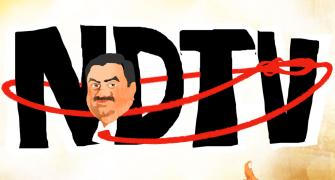India Inc was on a buying spree in 2004, with a number of acquisitions, spurred by globalisation and robust market conditions.
An urge to offer cost-effective products both in domestic and international markets and shore-up resources were also the reasons for lapping up overseas companies.
The Tata group was on the forefront of acquisitions with two major deals - snapping up of Tyco Global Network by Videsh Sanchar Nigam Ltd and acquiring Singapore-based NatSteel by Tata Steel Ltd - even as the group subsidiaries like Tata Motors pitched in with takeovers during the year.
Tata Steel's acquisition of Singapore-based NatSteel in August topped the charts for the group in 2004 as it was bought for a whopping Rs 1,313 crore (Rs 13.13 billion).
Tata Steel managing director B Muthuraman said it would help the company expand its manufacturing footprint to seven countries in Asia, including Vietnam, Singapore and Thailand, and provide an easier access to the emerging Asian markets.
Another major buy for the group was the acquisition of South Korea-based Daewoo Commercial Vehicle Corp for Rs 465 crore (Rs 4.65 billion) by Tata Motors.
The acquisition of DWCV, Korea's second biggest heavy truck maker, fell through in March this year. Tata Group chairman Ratan N Tata, who was in South Korea for the takeover, said "this is a major step for Tata Motors and a milestone for the group in its quest for globalisation."
Another big-ticket acquisition for the group was of Tyco Global Network, which was acquired by Videsh Sanchar Nigam in November 2004.
VSNL had acquired Tyco for Rs 585 crore (Rs 5.85 billion) in an all cash deal,
pipping Reliance Industries, which had also bid for the submarine cable provider, especially after it bought over US-based FLAG Telecom in 2003 for $211 million.
Earlier in March, VSNL acquired Internet Service Provider division of Chennai-based Dishnet DSL for Rs 270 crore (Rs 2.7 billion), in a slump-sale transaction. The buy also included Internet assets, employees and customers of Dishnet's ISP division.
The move was to further consolidate VSNL's position in dial-up space and with this VSNL would have access to over 600 owned and franchised cyber cafes of In a move to strengthen its offerings for the insurance sector.
Tata Consultancy Services bought over Phoenix Global Solutions in May this year for an undisclosed sum.
PGS, an insurance company, is a subsidiary of US-based Phoenix Companies Inc. The acquisition, even though not a big ticket one, was in line with its focus to consolidate the strengths developed by TCS in the financial segments, TCS managing director and chief executive officer S Ramadorai said.
Compared to the major buys of Tata, Reliance Industries had only one major acquisition - Trevira Gmbh & Co KG, a German speciality polyester firm.
However, the group had a major deal acquisition in 2003 - FLAG Telecom Ltd in October - even though it received shareholders and regulatory approvals only by January 2004.
The acquisition, according to RIL chairman and managing director Mukesh Ambani, would propel the company as the world's biggest polyester producer in terms of capacity.
In November, General Electric sold 60 per cent stake in its Indian BPO arm GECIS to two strategic partners - General Atlantic Partners and Oak Hill Capital Partners for $500 million.
Even though the stake was sold to two global firms, GECIS was to be headed by Indians, including its president and chief executive officer Pramod Bhasin.
Treading the path of business conglomerates were family-owned businesses which also went on an overseas acquisition spree in 2004.
In November, Pune-based Kirloskar Group acquired certain assets and businesses of UK-based SPP Pumps through a group company Kirloskar Brothers.
Marking its entry into the aluminium auto-component business, Bharat Forge acquired CDP Aluminiumtechnik, a German company in aluminium-forged components for 6.30 million euros in December.
The transaction was an all cash deal funded by way of equity of 3.80 million euros and non-recourse debt of 2.50 million euros.
Not to be left behind, Indian automobile majors also went on an acquisition spree in 2004, mainly to expand overseas and to gain access to hitherto unexplored territories.
Indian automotive major Mahindra & Mahindra jumped into the acquisition bandwagon. M&M signed a joint venture with Jiangling Motor Corporation Group of China this month to acquire 80 per cent stake in its subsidiary Jiangling Tractor Company.
M&M would invest $8 million in the joint venture, which was valued at $10 million. This would help the company expand its presence and strengthen its existing distribution network in China, according to M&M president (farm equipment sector) Anjanikumar Choudhari.
However, Indian pharmaceutical companies were quiet on the acquisition front after having been on a buying spree in 2003, as far as international buyouts are taken into consideration during the year.
The only acquisition by an Indian pharma major in the year was that of UK-based Rhodia Organique Fine (Rhodia) by Nicholas Piramal India for $14 million.
The Ajay Piramal-promoted company signed an agreement in December 2004 to acquire inhalation anaesthetics business of Rhodia to help it create a "significant" presence in the niche global inhalation anaesthetics market
In December, pharmaceutical major Ranbaxy Laboratories initiated talks to acquire two firms in Germany and the US, besides plans to set up a manufacturing unit in Brazil.
In October, confectionary major Candico acquired a plant in Tanzania and proposed to set up another in Johannesburg with an investment of $5 million.
Meanwhile, Oil and Natural Gas Corporation was eyeing oilfield belonging to Royal Dutch Petroleum and the embattled Russian giant Yukos. The oil major's intention was to secure access to the resources, crucial for its growth in a highly competitive industry.







